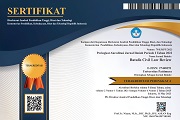Kajian Kritis Terhadap Dualisme Pengadilan Elektronik (E-Court) dan Konvensional
 )
)
(1) Fakultas Hukum Universitas Wijayakusuma Purwokerto, Indonesia
(2) Fakultas Hukum Universitas Wijayakusuma Purwokerto, Indonesia
(3) (ID SCOPUS: 57203912837) Fakultas Hukum Universitas Wijayakusuma Purwokerto, Indonesia
 Corresponding Author
Corresponding Author
Abstract
This study aims to determine how the application of electronisc justice system (e-Court) in providing the principle of benefit for the parties in civil cases. This study uses a normative juridical approach with secondary data sources supported by primary data. The results showed that the existence of electronisc justice system (e-Court) can provide the principle of benefit for the parties including transparency of the process, cost, and time efficiency for justice seekers who are able to access IT (Information Technology) and the existence of dualism is still needed for justice seekers which still requires conventional proceedings due to limited access to IT (Information Technology).
Keywords
DOI
10.47268/ballrev.v1i1.421
Published
2020-10-30
How To Cite
@article{BALLREV421,
author = {Khotib Hidayat and Aris Priyadi and Elly Purwendah},
title = {Kajian Kritis Terhadap Dualisme Pengadilan Elektronik (E-Court) dan Konvensional},
journal = {Batulis Civil Law Review},
volume = {1},
number = {1},
year = {2020},
keywords = {Electronics Justice System (e-Court); Law of Civil Procedure; Court Dualism},
abstract = {This study aims to determine how the application of electronisc justice system (e-Court) in providing the principle of benefit for the parties in civil cases. This study uses a normative juridical approach with secondary data sources supported by primary data. The results showed that the existence of electronisc justice system (e-Court) can provide the principle of benefit for the parties including transparency of the process, cost, and time efficiency for justice seekers who are able to access IT (Information Technology) and the existence of dualism is still needed for justice seekers which still requires conventional proceedings due to limited access to IT (Information Technology).},
issn = {2746-8151}, pages = {14--23} doi = {10.47268/ballrev.v1i1.421},
url = {https://fhukum.unpatti.ac.id/jurnal/ballrev/article/view/421}
}
Jurnal
Lumbanraja, A. D. (2020). Perkembangan Regulasi dan Pelaksanaan Persidangan online Di Indonesia dan Amerika Serikat Selama Pandemi Covid-19. Jurnal Crepido, 02(01), 46-58.
Retnaningsih, S., Nasution, D. L. S., Velentina, R. A., Manthovani, K. (2020). Pelaksanaan E-Court Menurut Perma Nomor 3 Tahun 2018 Tentang Administrasi Perkara Di Pengadilan Secara Elektronik dan E-Litigation Menurut Perma Nomor 1 Tahun 2019 Tentang Administrasi Perkara dan Persidangan Di Pengadilan Secara Elektronik (Studi Di Peng. Jurnal Hukum & Pembangunan, 50(1), 124-144. https://doi.org/10.21143/jhp.vol50.no1.2486
Sudarsono. (2019). Konsep Peradilan Secara Elektronik Di Lingkungan Peradilan Tata Usaha Negara. Tanjungpura Law Journal, 3(1), 42-64.
Sunarto. (2016). Prinsip Hakim Aktif Dalam Perkara Perdata. Jurnal Hukum Dan Peradilan, 5(2), 249-276. https://doi.org/10.25216/JHP.5.2.2016.249-276
Wantu, F. M. (2012). Mewujudkan Kepastian Hukum, Keadilan Dan Kemanfaatan Dalam Putusan Hakim Di Peradilan Perdata. Jurnal Dinamika Hukum, 12(3), 481-489. http://dinamikahukum.fh.unsoed.ac.id/index.php/JDH/article/view/121/68
https://doi.org/10.20884/1.jdh.2012.12.3.121
Wijayanta, T. (2014). Asas Kepastian Hukum, Keadilan dan Kemanfaatan dalam Kaitannya dengan Putusan Kepailitan Pengadilan Niaga. Jurnal Dinamika Hukum, 14(2), 216-226. https://doi.org/10.20884/1.jdh.2014.14.2.291
Buku
Ali, Z. (2016). Metode Penelitian Hukum. Jakarta: Sinar Grafika.
Fakhriah, E. L. (2019). Kapita Selekta Hukum Acara Perdata Indonesia. Bandung: Mandar Maju.
Syahrani, R. (2016). Sistem Peradilan dan Hukum Acara Perdata di Indonesia. Bandung: Citra Aditya Bakti.
Online/World Wide Web
Mahkama Agung RI. (n.d.). e-Court Mahkamah Agung RI. Retrieved October 11, 2019, from https://ecourt.mahkamahagung.go.id
Pengadilan Negeri Ungaran. (n.d.). Prosedur Perkara Perdata. Retrieved January 10, 2020, from http://pn-ungaran.go.id/home/index.php/prosedur-perkara/prosedur-perkara-perdata/254-pengajuan-gugatan
| Dublin Core | PKP Metadata Items | Metadata for this Document | |
| 1. | Title | Title of document | Kajian Kritis Terhadap Dualisme Pengadilan Elektronik (E-Court) dan Konvensional |
| 2. | Creator | Author's name, affiliation, country | Khotib Iqbal Hidayat; Fakultas Hukum Universitas Wijayakusuma Purwokerto; Indonesia |
| 2. | Creator | Author's name, affiliation, country | Aris Priyadi; Fakultas Hukum Universitas Wijayakusuma Purwokerto; Indonesia |
| 2. | Creator | Author's name, affiliation, country | Elly Kristiani Purwendah; (ID SCOPUS: 57203912837) Fakultas Hukum Universitas Wijayakusuma Purwokerto; Indonesia |
| 3. | Subject | Discipline(s) | |
| 3. | Subject | Keyword(s) | Electronics Justice System (e-Court); Law of Civil Procedure; Court Dualism |
| 4. | Description | Abstract | This study aims to determine how the application of electronisc justice system (e-Court) in providing the principle of benefit for the parties in civil cases. This study uses a normative juridical approach with secondary data sources supported by primary data. The results showed that the existence of electronisc justice system (e-Court) can provide the principle of benefit for the parties including transparency of the process, cost, and time efficiency for justice seekers who are able to access IT (Information Technology) and the existence of dualism is still needed for justice seekers which still requires conventional proceedings due to limited access to IT (Information Technology). |
| 5. | Publisher | Organizing agency, location | Faculty of Law, Universitas Pattimura |
| 6. | Contributor | Sponsor(s) | |
| 7. | Date | (YYYY-MM-DD) | 2020-10-30 |
| 8. | Type | Status & genre | Peer-reviewed Article |
| 8. | Type | Type | |
| 9. | Format | File format | |
| 10. | Identifier | Uniform Resource Identifier | https://fhukum.unpatti.ac.id/jurnal/ballrev/article/view/421 |
| 10. | Identifier | Digital Object Identifier | 10.47268/ballrev.v1i1.421 |
| 11. | Source | Title; vol., no. (year) | Batulis Civil Law Review; Vol 1, No 1 (2020): VOLUME 1 NOMOR 1, NOVEMBER 2020 |
| 12. | Language | English=en | en |
| 13. | Relation | Supp. Files | |
| 14. | Coverage | Geo-spatial location, chronological period, research sample (gender, age, etc.) | |
| 15. | Rights | Copyright and permissions | Copyright: Authors who publish their manuscripts in this Journal agree to the following conditions: 1. The copyright in each article belongs to the author, as well as the right to patent. 2. Authors are able to enter into separate, additional contractual arrangements for the non-exclusive distribution of the journal's published version of the work (e.g., post it to an institutional repository or publish it in a book), with an acknowledgment of its initial publication in this journal. 3. Authors are permitted and encouraged to post their work online (e.g., in institutional repositories or on their website) prior to and during the submission process, as it can lead to productive exchanges, as well as earlier and greater citation of published work. 4. Authors have the right to self-archiving of the article (Author Self-Archiving Policy)
Licence : Batulis Civil Law Review Journal is disseminated based on the Creative Commons Attribution-NonCommercial 4.0 International license terms. This license allows anyone to copy and redistribute this material in any form or format, compose, modify, and make derivatives of this material for any purpose. You cannot use this material for commercial purposes. You must specify an appropriate name, include a link to the license, and certify that any changes have been made. You can do this in a way that is appropriate, but does not imply that the licensor supports you or your use.
|
Copyright (c) 2020 Khotib Iqbal Hidayat, Aris Priyadi, Elly Kristiani Purwendah

This work is licensed under a Creative Commons Attribution-NonCommercial 4.0 International License.

 : 7363 times
: 7363 times Download : 6970 times
Download : 6970 times














